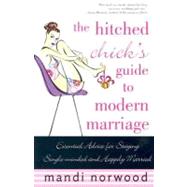
Note: Supplemental materials are not guaranteed with Rental or Used book purchases.
Purchase Benefits
What is included with this book?
| Prologue: The birth of Hitched Chick | p. 1 |
| Me, Myself and I: Retaining and maintaining identity | p. 13 |
| Lust ... or Bust! Why women want more sex and extra passion | p. 56 |
| Dollars and Sense: Earning, spending, saving and controlling | p. 131 |
| Infidelity: Why--and how--wives have affairs | p. 172 |
| The Power and the Glory: How wives stay on top (even when his mother visits) | p. 219 |
| Secrets and Lies: What wives never tell | p. 267 |
| Epilogue | p. 302 |
| Acknowledgments | p. 308 |
| Table of Contents provided by Ingram. All Rights Reserved. |
The New copy of this book will include any supplemental materials advertised. Please check the title of the book to determine if it should include any access cards, study guides, lab manuals, CDs, etc.
The Used, Rental and eBook copies of this book are not guaranteed to include any supplemental materials. Typically, only the book itself is included. This is true even if the title states it includes any access cards, study guides, lab manuals, CDs, etc.